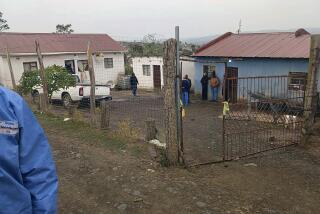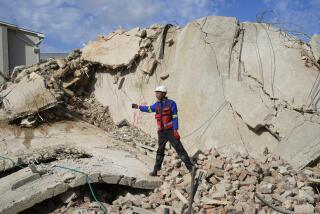1 Dead, 56 Hurt in Blast at South African Restaurant
JOHANNESBURG, South Africa — Amid increasing guerrilla attacks on South African civilians, a bomb exploded inside a crowded fast-food restaurant at lunchtime Saturday, killing a 21-year-old white woman and injuring 56 others, most of them also white, police said.
The blast, at a shopping mall 15 miles east of Johannesburg in Benoni, was caused by a limpet mine planted under a chair in the center of a Wimpy Bar restaurant, said Lt. Willem Meyer, a police spokesman.
Pieces of tables and glass, as well as shoes and handbags, were strewn over a wide area of the mall, and rescue workers left bloody footprints in front of the restaurant as they carried victims to ambulances. At least nine of the injured were seriously hurt, police said.
It was the second fatal attack aimed primarily at whites here in less than a month and marked the fifth white death this year. More than 30 bombs or hand grenades have exploded in South Africa this year, killing 20 people and causing several hundred injuries.
ANC Blamed
Law and Order Minister Adriaan Vlok blamed the blast on the African National Congress, the largest and best-funded guerrilla group fighting the white minority-led government.
“It is convincing proof that the ANC views all the inhabitants of South Africa as its enemies and bases its hope on violence only,” Vlok told state-run television.
South African authorities are growing increasingly worried about the spate of recent bomb explosions, and police have tried to assure whites that they still are safe.
Political analysts here say the bombs are part of the most sustained attack yet on non-military, non-governmental targets by anti-apartheid guerrillas. In a June interview with two newspapers at ANC headquarters in Lusaka, Zambia, the group’s new military chief vowed to make apartheid “very painful and bitter for whites.”
Blast at Rugby Match
Two white men were killed earlier this month when a car bomb exploded outside a Johannesburg stadium following a rugby match attended by 20,000 people, and a bomb at a shopping center in Roodepoort last month killed three black men and a white woman.
Saturday’s explosion came at the busiest shopping time of the week, and the mall was packed.
“I saw one man run from the Wimpy with his hair on fire, and people were lying all over the place,” Chris Croucamp, a police officer, told United Press International. Croucamp was sitting about 25 feet from the bomb with his pregnant wife, who went into shock after the explosion and was taken to a hospital.
Earlier Saturday, another limpet mine exploded at a bus stop in Germiston, about five miles east of Johannesburg, injuring one person, police said.
Favored Weapon
Although the ANC rarely confirms or denies responsibility for such attacks, limpet mines--explosive devices designed to cling to their targets--are the exiled group’s favored weapon.
The blasts marked the second consecutive day of trouble in the country.
On Friday, bombs exploded at Johannesburg and Durban movie houses showing the anti-apartheid film “Cry Freedom,” but there were no injuries. Explosive devices were discovered at two other theaters as well.
The government banned “Cry Freedom” hours after it opened Friday, saying it might incite racial violence. The film portrays the friendship between black anti-apartheid leader Steve Biko, who died in police custody in 1977, and liberal white newspaper editor Donald Woods.
Many political observers here doubt that the bombs planted at theaters on Friday were the work of anti-apartheid guerrillas.
The ANC, which has waged a guerrilla war for 27 years against Pretoria, has said that while it aims primarily at military and government targets, some civilian casualties are inevitable. But analysts say some ANC officials now believe that increased attacks on white South Africans are the only way to put pressure on the government for rapid change in the country.
Many blacks and a few whites say such attacks are necessary because avenues for peaceful change have been closed by government bans on 17 political organizations and the detention of thousands of people who support nonviolent means of gaining black political rights.
More to Read
Sign up for Essential California
The most important California stories and recommendations in your inbox every morning.
You may occasionally receive promotional content from the Los Angeles Times.











